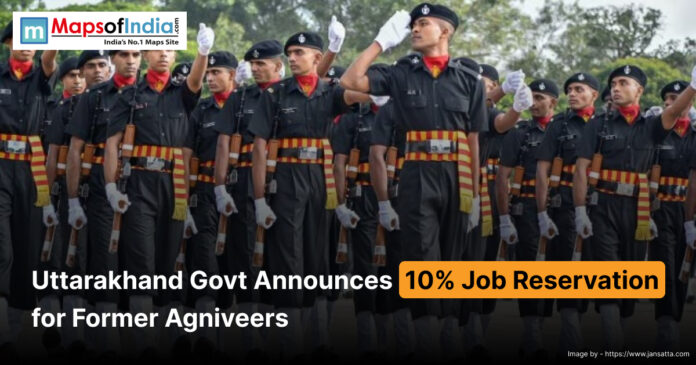The Uttarakhand government has decided to give a 10% reservation in state government employment to those who had served in the armed forces as Agniveers in the Agnipath scheme in a major decision to honour their service. In accompaniment to this, the government has also come up with a massive omission of upper age to such candidates, and this would be equal to the number of years served in the military.
This will apply in several departments of the government, according to the official announcement, so after the end of their service in the military, former Agniveers will have more chances of stable employment. To illustrate, an Agniveer who has put in four years of service will be eligible for four more years of relaxation in the maximum age requirement to apply for state government jobs.
CM Pushkar Singh Dhami said that the move pinpoints how seriously the state takes the well-being of its soldiers and ex-servicemen. “Uttarakhand boasts of a good military history, and we have Agniveers whom we can be proud of. This will allow them to make a seamless transition into civilian life as they can apply their skills and discipline in serving the people,” he said.
The Agnipath scheme introduced by the Central Government is a program that hires young men and women into the military services on the basis of a four-year term in the military, after which some of them can be retained, whereas the others go back to civilian life. This effort at the state level, which the state of Uttarakhand has taken with regard to the elderly leaving the armed forces, aims at seeing that the individual finds themselves with opportunities in case he/she opts out of the armed forces.
Organizations and groups of ex-servicemen and defence welfare have hailed the move, describing it will go a long way in improving the morale of Agniveers and attracting more youth of Uttarakhand towards the armed forces. They also underlined that all those skills obtained in the army, like leadership, work, discipline, and crisis management, will be of great value in governmental work.
The representatives specified that thorough guidelines will be published concerning the way the policy is supposed to be implemented, as well as the specific departments and recruiting practices it will incorporate shortly. The policy will be implemented in the new cycles of recruitment.
This move is now being viewed as a welfare step on the one hand, as well as an investment in skilled human resources in terms of the number of thousands of young men and women who are recruited each year to the armed forces in Uttarakhand.










